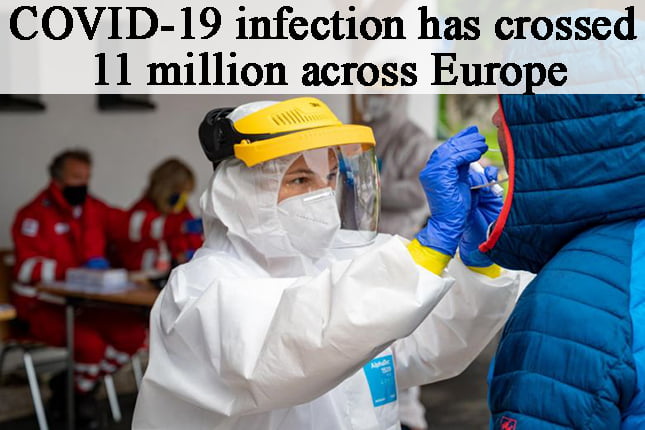The situation in European countries is worsening day by day without showing any signs of a decline in infection. With more than 11 million coronavirus cases confirmed, the concern of COVID-19 in European countries has further increased.
As of yesterday (Tuesday), 11,008,665 virus infections and almost 285,000 deaths have been reported in Europe.
Lockdown was announced in Austria and Greece following an increase in the number of COVID-19 cases. Greece shut down its main cities on Monday evening and Austria, which had not yet been freed from a deadly shootout on the streets of Vienna, was partially closed.
With this, Austria and Greece became the newest countries on the continent to impose shutdowns. Earlier, Belgium, France, Germany and Ireland re-imposed strict restrictions.
Liverpool are preparing for it, just as Slovakia has decided to test their entire population. The antigen test was carried out on 3.6 million people in Slovakia (two-thirds of their total population of 5.4) and confirmed the virus in 1.06% of people.
UK Prime Minister Boris Johnson said: “Dependent on their success in Liverpool, we will aim to distribute millions of these new rapid tests between now and Christmas and empower local communities to use them to drive down transmission in their areas.”
It was decided to open bookstores for the mental well-being of the people in Belgium, which has the highest number of deaths compared to the population.
In Greece, cafes, restaurants, bars, gyms, cinemas, theaters, and most non-essential businesses in the capital, Athens, were also closed. Strict restrictions have been imposed in the northern cities of Thessaloniki and Serres. These tight measures have drawn concern among business-owners and employees.
A French hospitals federation said the pressure was such that authorities were planning to transfer Covid-19 patients to Germany for treatment. Belgium is doing the same.
Uwe Janssens, president of Germany’s Interdisciplinary Association for Intensive Care and Emergency Medicine said: Germany should postpone non-urgent surgeries to free up beds and staff. Meanwhile health Minister Jens Spahn said Germany had enough beds and ventilators for now.


Comments are closed.